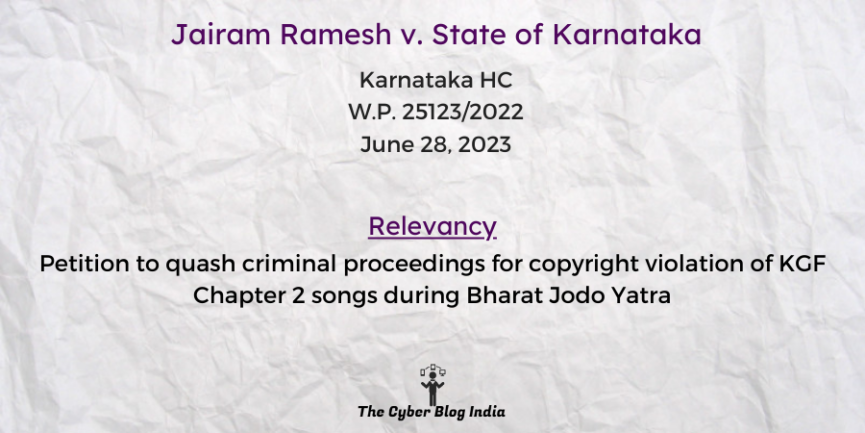Jairam Ramesh v. State of Karnataka

Jairam Ramesh v. State of Karnataka
In the High Court of Karnataka
W.P. 25123/2022
Before Justice M. Nagaprasanna
Decided on June 28, 2023
Relevancy of the case: Petition to quash criminal proceedings for copyright violation of KGF Chapter 2 songs during Bharat Jodo Yatra
Statutes and Provisions Involved
- The Information Technology Act, 2000 (Section 66)
- The Indian Penal Code, 1860 (Sections 34, 120B, 403, 465)
- The Copyright Act, 1957 (Section 63)
Relevant Facts of the Case
- The petitioners used popular songs from the movie KGF Chapter 2 during their political rallies in Karnataka as part of the Bharat Jodo Yatra.
- They uploaded videos with the copyrighted songs in the background on their social media handles. They also replaced the second respondent’s “MTR Music” logo with the “Bharat Jodo Yatra” logo.
- The second respondent registered a criminal complaint against the petitioners for violating their copyright to the songs.
- The petitioner has filed this petition against the registration of the crime.
Prominent Arguments by the Advocates
The petitioner’s counsel argued that:
- The copyright’s ownership is questionable. The petitioner is not infringing on the copyright, as the respondent is only a licensee, not the rightful owner.
- The petitioner’s use comes under fair use, as outlined in Section 52 of the Copyright Act, 1957. Therefore, it does not amount to copyright infringement.
- Moreover, civil remedies are available for copyright infringement under Section 55. Therefore, pursuing criminal prosecution in addition to civil remedies is redundant and unjustified. Civil proceedings offer adequate recourse for the respondent.
- Simultaneous civil and criminal proceedings are unnecessary and could lead to judicial inefficiency.
The respondent’s counsel submitted that:
- There is sufficient evidence to establish the respondent’s ownership of the copyright. The petitioner’s attempts to dispute this ownership are unfounded and lack merit.
- Copyright infringement is a criminal offence under Section 63 of the Copyright Act, 1957.
- The petitioner’s actions, including source code tampering and unauthorised use, constitute a clear violation of copyright law and certainly warrant criminal prosecution.
- An investigation is necessary to gather evidence and determine the extent of infringement committed by the petitioner.
- Protecting intellectual property rights and ensuring copyright holders can exercise their exclusive rights without interference is essential.
- Allowing the petitioner’s actions to go unchecked will set a dangerous precedent and undermine the integrity of copyright law.
Opinion of the Bench
- The complainant was an assignee of the song’s copyright and has a right to complain against infringement upon violation.
- The civil remedy available under the Copyright Act, 1957, does not bar the criminal proceedings initiated by the complainant.
- The evidence suggests a prima facie case for copyright infringement; further investigation is necessary to determine this.
Final Decision
- The court rejected the petition.
Harmannat Kour, an undergraduate student at the Law School, University of Jammu, and Jyotsna Sood, an undergraduate student at the National Law Institute University, Bhopal, prepared this case summary during their internship with The Cyber Blog India in May/June 2024.
